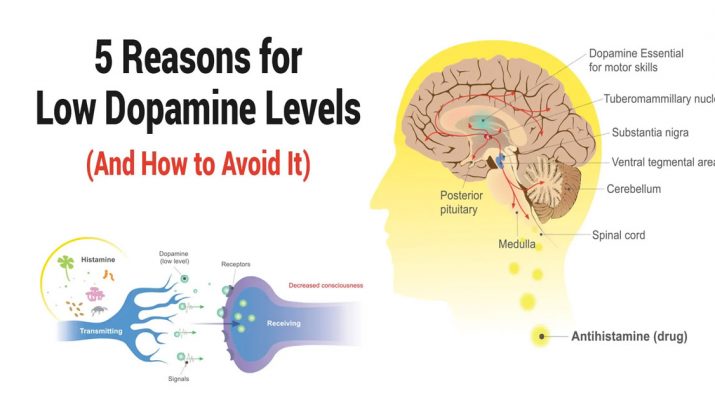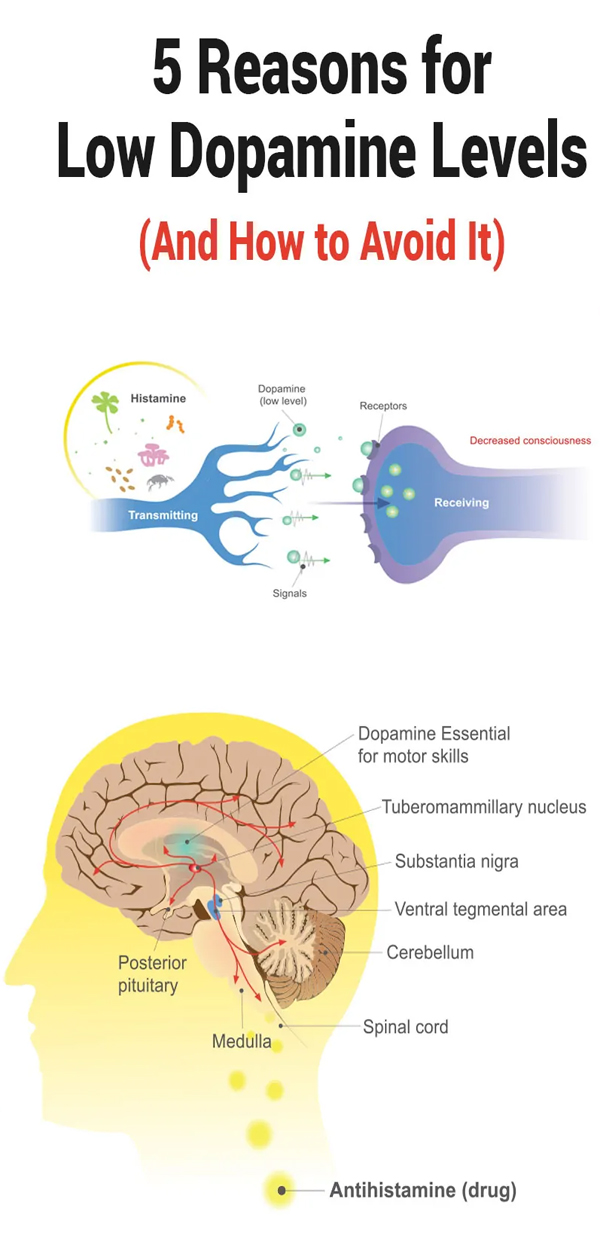In this article, we are going to talk a bit more about dopamine – including:
- What it does
- Its relationship with other neurotransmitters
- Reasons for low dopamine levels
- How to avoid and treat dopamine deficiency
Let’s do this thing!
What Is Dopamine?
“Dopamine plays an important role in controlling motor behavior, the emotional reward, and behavior motivation mechanisms.” – Veronika Polozkova (source)
Dopamine is a neurotransmitter – a hormone-like communication or message – that travels through the nervous system. It does multiple things, but it is most commonly associated with providing feelings of pleasure and reward. Dopamine also gives you feelings of vitality and “aliveness.”
Research shows that anticipating any reward increases dopamine levels in the brain. Dopamine serves as the driver – or motivational component – of all reward-motivated behaviors. Outside of the brain, dopamine suppresses norepinephrine release, expands the blood vessels, stimulates sodium excretion (which increases urine outflow), and aids in digestion by protecting the intestinal mucosa.
Prescription medications such as modafinil (for treating excessive sleepiness), Ritalin (for relieving ADHD symptoms) and Prozac (an antidepressant) work by manipulating dopamine levels in the brain. It is also released through the use of certain illicit drugs, including methamphetamine and cocaine. In fact, it is how these drugs manipulate dopamine supply that triggers addiction.
Dopamine is produced through an essential amino acid called phenylalanine. We consume this amino acid through diet or supplementation. Phenylalanine is converted into tyrosine – a non-essential amino acid – in the liver. Tyrosine, with the help of insulin, crosses the blood-brain barrier (BBB) and is converted into DOPA, which is then converted into dopamine, provided that there are sufficient vitamin B6 levels in the brain. It really is a chain reaction!
Dopamine influences multiple brain functions – including concentration, learning, memory, mood, motor control, and sleep. Low dopamine levels often impact all of these cognitive processes.
Dopamine Deficiency
People who are deficient in dopamine lack motivation and drive. They also become fatigued, apathetic, and possibly depressed. They may suffer from mood issues and develop an addictive personality (alcohol and drugs boost dopamine levels in the short-term). Dopamine deficiencies can lead to resting tremors, such as Parkinson’s Disease (PD).
Other potential symptoms of dopamine deficiency include: anxiety, constipation, difficulty eating and swallowing, feelings of sadness or tearfulness, inability to focus, loss of balance, loss of motivation, low energy, low sex drive, gastroesophageal reflux disease (GERD), muscle aches and pains, muscle stiffness, sudden weight loss or weight gain, trouble sleeping or disturbed sleep, and others.
Since the prospect of potential rewards increases dopamine levels in the brain, individuals with low dopamine levels or an addictive personality may develop harmful behaviors such as excessive gambling and shopping. When loss is experienced – usually in the form of money or status – the person may continue to repeat the harmful behaviors to either (a) recuperate their losses, or (b) relive the same “high.” (Shopping and gambling problems are similar to illegal drugs in this way.)
Peripherally, dopamine is found within the cells of the substantial nigra – a basal ganglia structure situated in the midbrain. To coordinate muscle control, neurons in this part of the brain use dopamine to communicate with other regions of the basal ganglia. If neurons of the substantial nigra deteriorate and die, the brain is unable to effectively coordinate movement, leading to neurodegenerative conditions like Parkinson’s disease.
5 Reasons For Low Dopamine Levels (And How To Avoid It)
The five leading reasons for low dopamine levels are:
-
Depression
While the exact causes of depression are unknown, a genetic predisposition to low serotonin and dopamine levels may be determining factors. Treating depression can be a complicated endeavor indeed, and pharmacological trial and error aren’t altogether uncommon. Concerning the last, understanding and clearly conveying depression symptoms to a doctor or other healthcare professional can make a difference. For example, the depressive symptom of low motivation is probably caused by a dopamine system dysfunction.
Although prescription medication may be necessary for some, this isn’t the case for every person. Sometimes, natural remedies and (or) lifestyle alterations may help, if not entirely eliminate, depressive symptoms.
How to Avoid It: Depression is probably triggered by environmental or genetic factors or a combination of both. Commonsensical advice – getting more exercise, laying off alcohol, not smoking, limiting stress, etc. – may go a long way to preventing the onset or worsening of depression. However, given the severe nature of the illness, discussing one’s situation with a qualified medical professional or counselor may be in order.
-
Not Enough L-Tyrosine
Protein foods – and the building blocks of amino acids, especially tyrosine – are essential to the production of dopamine. Therefore, not consuming enough tyrosine and other protein-derived amino acids will, naturally, cause dopamine levels to drop.
Per a study published in Nutrition Journal, researchers found that a high protein breakfast both reduces cravings for “sweet and savory foods” and raises the levels of homovanillic acid (HVA), which is a key measure of dopamine production.
How to Avoid It: Eat more lean protein, including eggs, fatty fish, and low-fat yogurt. If you’re a vegan or vegetarian, look for produces such as beans, nuts, oats, and wheat (also be sure to see our dietary recommendations below!).
-
Poor Diet
Unsurprisingly, the food that you eat impacts your dopamine levels, which in turn affects how you feel. Food’s relationship with dopamine is a complicated one. To illustrate this point, consider sweets (e.g. baked goods, candy, etc.). The availability of sweets will cause your dopamine levels to rise, only to plummet once the treat is consumed.
Healthy foods, on the other hand, will trigger no such rise in dopamine levels – at least at first sight. However, because of the inherent properties of several foods (see list below), dopamine levels indeed increase sometime after the food is digested.
How to Avoid It: There is indeed a “happy” diet that can make a difference. (Bonus: you also lose weight!) The eating regiment centers around seven specific foods:
- Dark chocolate
- Dairy foods like cheese, milk, and yogurt
- Eggs
- Fatty fish like mackerel and salmon
- Fruit and vegetables, especially bananas
- Minimally or unprocessed meats such as beef, chicken, and turkey
- Nuts like almonds and walnuts
-
Drug Abuse
Individuals with naturally low dopamine and serotonin levels (our “happy” chemicals) may be more at risk for abusing alcohol and illegal substances. As the ongoing opioid epidemic in North American demonstrates, it’s not just illicit street drugs like heroin or cocaine being abused.
A 2018 study published in the journal Neuropsychopharmacology (phew!) compares the brain images of users of alcohol, cannabis, and opioids to those of healthy people. The researchers found significant differences in the dopaminergic pathways of alcohol and opioid abusers, but not cannabis users. The former group showed “significantly lower (receptor) availability” compared to the control (“normal”) group. The latter subjects were found to have “significantly lower receptor … and transporter availability.”
How to Avoid It: While the study mentioned above did not delve into the environmental circumstances surrounding alcohol and opioid users, these circumstances can certainly make the difference between someone who becomes a user and someone who doesn’t.
People who have substance abuse problems should seek out an empathetic and knowledgeable ear. It’s also critical for people to understand that there are treatment options available that can naturally “reset” the brain’s chemical makeup.
-
Obesity
In a study published in the Journal of Neuroscience, researchers discovered that variations in a “fat mass and obesity-associated (FTO) gene are linked to obesity,” and that “variants in FTO [levels] … affect [dopamine]-dependent midbrain responses…”
In other words, a slight change to a certain whatchamacallit gene not only predisposes one to obesity but suppresses the dopamine response. This dopamine signaling mechanism is called “D2R,” which is associated with learning and responding to adverse outcomes. The research team concludes that alterations to this gene may affect the ability to control impulses.
How to Avoid It: Since this reason for low dopamine is genetic in nature, there is little that can be done to “avoid” the problem. At least until genetic engineering becomes more developed and accepted. As exercise is known to increase dopamine levels, a regular fitness regimen is probably the best solution here.
Final Thoughts
Potential causes of a dopamine deficiency include caffeine, long-term alcohol and drug use, nicotine, psychological stress, poor diet, lack of exercise, and low stomach acid. Certain things like caffeine, alcohol, and nicotine may provide a dopamine boost if not used in excess. The problem is that people consume more and more of these things – often to the point of addiction – which ends up decreasing dopamine levels in the long run.


